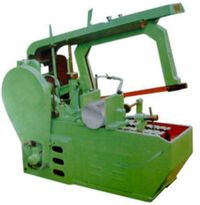Machine Hacksaw: Difference between revisions
From DT Online
m (DT Online moved page Machine hacksaw to Machine Hacksaw: Inconsistent linking) |
m (Standardised presentation of Note:) |
||
| Line 5: | Line 5: | ||
The nature of much D&T work now in schools relies generally on lighter sections and so cutting metal stock to length can now more more quickly be done using a '''[[Chop saw]]'''. | The nature of much D&T work now in schools relies generally on lighter sections and so cutting metal stock to length can now more more quickly be done using a '''[[Chop saw]]'''. | ||
Note: | ---- | ||
<span style="color: green">'''Note:''' | |||
Machine Hacksaws rely on a [https://en.wikipedia.org/wiki/Crank_%28mechanism%29 '''Crank and Slider'''] type mechanism to convert the rotary motion of the motor into a [https://en.wikipedia.org/wiki/Reciprocating_motion '''reciprocating'''] sawing action. | Machine Hacksaws rely on a [https://en.wikipedia.org/wiki/Crank_%28mechanism%29 '''Crank and Slider'''] type mechanism to convert the rotary motion of the motor into a [https://en.wikipedia.org/wiki/Reciprocating_motion '''reciprocating'''] sawing action. | ||
</span> | |||
---- | |||
Revision as of 13:46, 27 October 2014
Reciprocating Machine Hacksaws or Power Hacksaws were once common in schools and used for cutting metal stock to length - especially larger sections.
Blades commonly used are 300mm long and 10 or 12 tpi but other lengths and pitches are available for different materials and larger machines.
The nature of much D&T work now in schools relies generally on lighter sections and so cutting metal stock to length can now more more quickly be done using a Chop saw.
Note: Machine Hacksaws rely on a Crank and Slider type mechanism to convert the rotary motion of the motor into a reciprocating sawing action.
